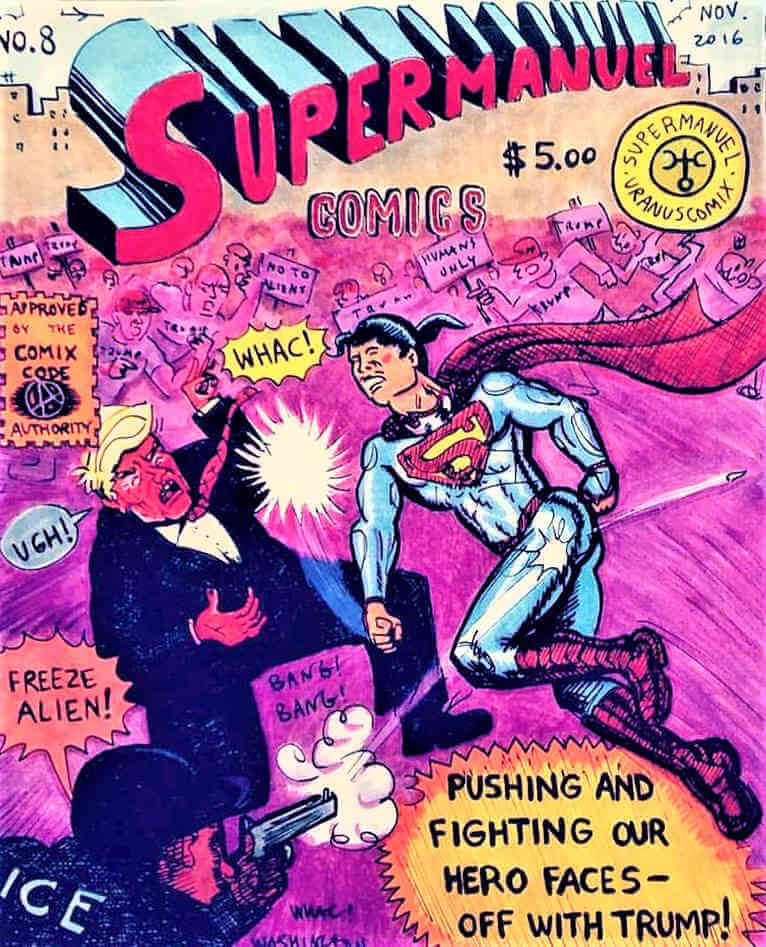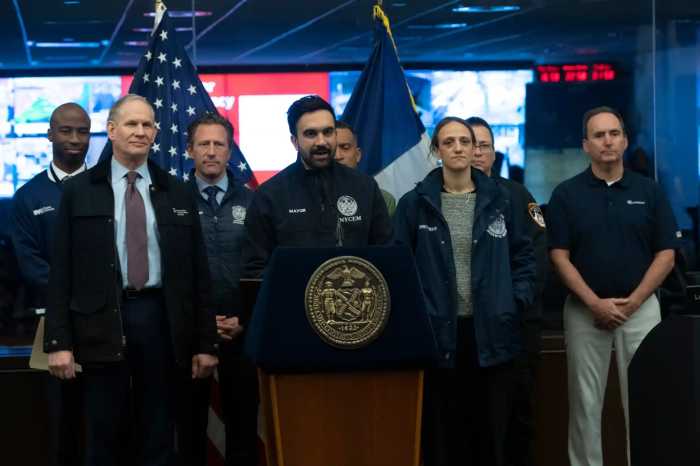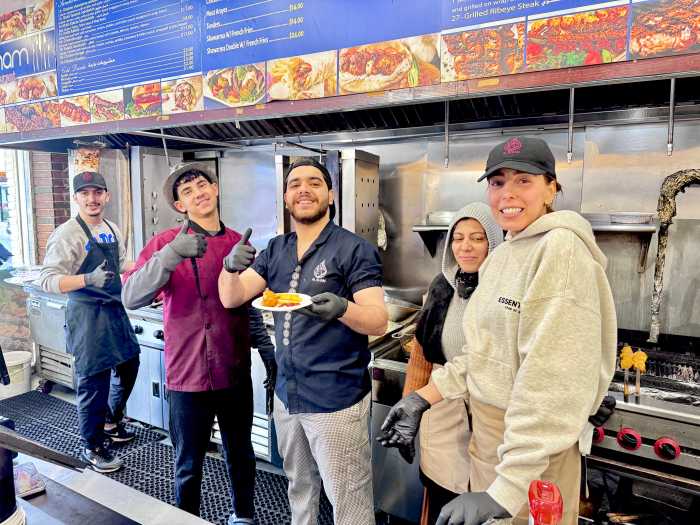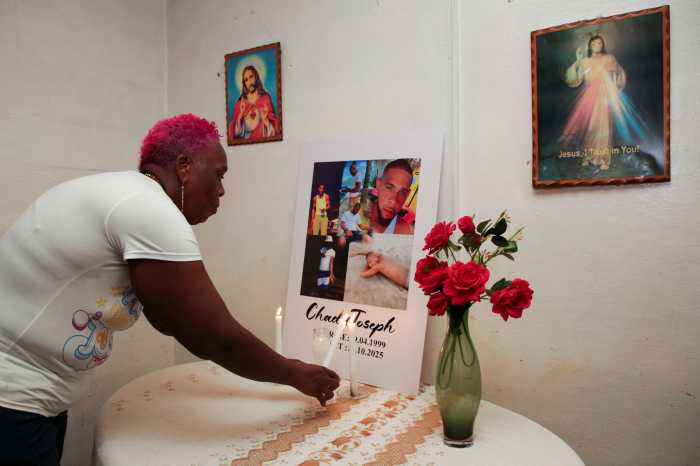Carlo Quispe is a Peruvian-born out gay comic book artist and author. His books and characters include “Carlito,” about a 10-year-old gay boy, the Latinx superhero of “Supermanuel,” and “Political Will,” about a queer activist. He has also published “Uranus Comics” and “WW3 Illustrated,” as well as “Hairy Tales,” about a gay werewolf, which was turned into a terrific animated short film by Pablo Oliverio.
On September 19, Quispe will kick off his appearance at the 2019 New York Art Book Fair — held at MoMA PS1 in Long Island City — by creating a live drawing, During the fair, which runs through September 22, he will present the latest editions of “WW3 Illustrated” and “Uranus Comics, Vol. 2” as part of its “Friendly Fire” program. As part of his appearance, he will premiere the “Creature of Uranus,” he explained in a recent phone interview, tittering at the name and warning, “It’s coming to invade Planet Earth!”
The artist draws on his life for his work. He grew up in Lima but also spent time in Madrid in the 1980s as a young boy. His family moved the US in the summer of 1991, when car and letter bombs — not to mention rolling blackouts and economic upheaval — posed a threat to his family in Peru. Emigrating to America and winning protection through political asylum, Quispe eventually ended up on Long Island with his mother, following his parents’ divorce.
It was as a child that he first discovered comics.
“I think that comics helped me learn colloquial English,” he said. “Marvel would phonetically spell accents, and that helped me acclimate to living in the US, so comics were important to me. Comics were a part of my life in Spain, too. My dad would get humor comics for himself and I would read them. It was something my dad and I had in common. He was a strict disciplinarian — law abiding and law enforcing — whereas I’m more relaxed and an artist. But we have the same taste in comics.”
Quispe would read adventure comics and adaptations of classic books, such as Mary Shelley’s “Frankenstein.” After he arrived in the US, his reading became “Spiderman” and “X-Men.” At age 16, he also discovered, in a comic shop that had a gay section, Howard Cruse’s collection “Wendel,” which, he recalled, was life-changing.
“It was my first exposure to homosexual life outside of Hollywood and porn,” Quispe said. “I’m a Latino Wendel!”
Quispe acknowledged that his character, Political Will, is a “more radical version of Wendel.” The artist features gay characters and gay sex unapologetically in his work and explained he was inspired as a teen by “The Joy of Gay Sex,” a gift from his 17-year-old boyfriend.
“The book opened with a series of explicit illustrations. I had never seen such an instructive and fun book — and I was 16!,” he recalled. “I found it more erotic than real porn. There was a section in there about the anus. I thought: What if I could make a comic about this topic? I made this little pamphlet on how to do it for the first time. I created my own gay character who would stand in for me and my partner. I tried to make it interesting and naughty — how to lube yourself up and douche — but I didn’t want to do it in a didactic way.”
The comic received positive feedback, which prompted Quispe to start publishing gay comics with Jennifer Camper (of “subGURLZ” fame). Camper introduced him to Cruse, who encouraged him to do more autobiographical work, and hence “Carlito” was born.
“People think it’s a cute kid’s story, but it’s not,” Quispe said. “It is hard for me to be open about [immigration] and to capitalize on it. But I feel like the immigrant experience is told by Trump in a negative way. I feel responsible to be the antidote to that. I know the reality, and I’m lucky to put it out there.”
Quispe became an American citizen in 2000.
“I initially wanted to make a comic denouncing white savior mentality,” he explained. “But then I realized I could put my argument in a different way, and instead of making people feel bad about this issue or like they are part of the problem I could make them fall in love with my story. Instead of being aggressive, and combative, and confrontational, I changed my approach to tell the story of me as a little kid and what I know about immigration. People are upset by kids in cages, but I didn’t want to use that imagery. The only way to relate their story to mine was that I was a kid. I felt I had to walk a fine line.”
And this is the strength of Quispe’s work. He balances the serious and humorous elements to engage readers and educate them about an issue.
“I want to make it a Platonic exercise, where two characters can have a dialogue and go in different directions,” he said. “Because I have five or eight pages to tell a story, I have to be economical and stuff in as much content as possible in these frames — which is why my comics end up a bit wordy. I have so much more I want to tell. So, I do it in a visual detail or offhand comment.”
Quispe is political, but his messages go down easy because his comics are highly stylized and clever. They make readers laugh and think. Quispe deliberately presents situations where folks can make up their own minds about an issue.
“I hope I can present a side in a way they can understand it,” he said. “When I make comics, I think of the typical reader for that publication.”
Quispe also talked about broadening the reach of comics in the US.
“I am aware that this industry is about appealing to white audiences, but I am trying to expand that readership to queer and Latin people. ‘Supermanuel’ is in color — that’s the only way I can do it, because he is brown. I started making all-ages comics, which are more universal and surreal, which I do without words for those who can’t read or speak English. I think: How can I cross over these barriers between me and my reader/customer?”
Quispe not only creates, publishes, and exhibits, he is also a born educator, running workshops in Washington Heights as well as at public libraries and other venues elsewhere. His eclectic work and energetic style have likely earned him a large and loyal following.
CARLO QUISPE | “Uranus Comics #2” & “WW3 Illustrated” | New York Art Book Fair | MoMA PS1, 22-25 Jackson Ave. at 46th Ave., Long Island City | Sep. 19-22 | printedmatterartbookfairs.org





































